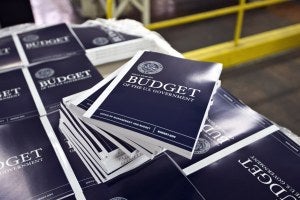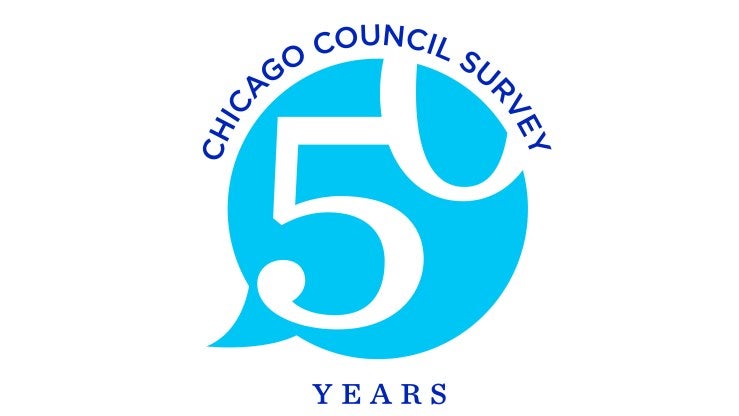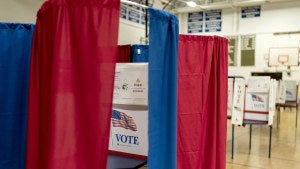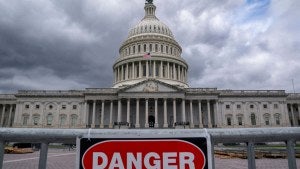Americans Prioritize Domestic Spending over Foreign Aid

The public wants to increase the budget for domestic issues like infrastructure and education but is divided over defense spending and foreign assistance.
The federal budget is a perennial election issue in the United States, with candidates often at odds over where the government should—and should not—spend taxpayer dollars.
This year’s Chicago Council Survey, fielded June 21–July 1, 2024, finds Americans broadly agree when it comes to government spending on domestic programs, including Social Security, healthcare, education, and public infrastructure projects. However, as conflicts escalate overseas, the US public is somewhat divided over how much should be spent on defense and foreign aid.
Key Takeaways
- Majorities of Americans want to expand the federal budget for healthcare (67%), education (66%), improvements to public infrastructure such as highways, bridges, and airports (66%), and Social Security (58%).
- Half want to cut back government spending on military aid (50%) and economic aid (51%) to other countries, while another third prefer to keep such spending about the same (35% military, 33% economic).
- A plurality want to maintain the current defense budget (39%), while roughly one-fourth prefer to either expand (28%) or cut back (26%) on defense spending.
Broad Support for Spending on Domestic Programs
When asked about spending on government programs, the US public seems focused on domestic concerns. In the 2024 survey, majorities of Americans express a desire to expand the federal budget for healthcare (67%), making improvements to public infrastructure such as highways, bridges, and airports (66%), education (66%), and Social Security (58%). This view is largely bipartisan, with majorities of Democrats and Independents and roughly half of Republicans in favor of boosting spending in these areas
Despite growing political polarization within the United States, broad public support for bread-and-butter programs at home is nothing new. In Council surveys dating back to 1974, Americans have consistently been more likely to favor expanding government spending on education, healthcare, Social Security, and public infrastructure than on defense and military or economic aid to other countries.
This trend mostly holds true across the partisan spectrum, particularly among Democrats and Independents. Republicans, meanwhile, have in some years favored increasing defense spending over the budget for some domestic issues. For instance, in 2002—the year after the 9/11 terror attacks—more GOP supporters wanted to boost defense spending than expand Social Security.
Partisan Divisions over Defense Spending
The public is somewhat divided over the appropriate level of defense spending. A plurality want to keep it about the same (41%) while roughly one-fourth each prefer to expand (28%) or cut back (26%) defense spending. This result also aligns with Council averages over the past five decades (38% maintain, 27% expand, 29% cut back).
Republicans are the most supportive of expanding the current US defense budget (49%, vs. 15% of Democrats and 25% of Independents). This viewpoint reflects past Council survey data that show GOP supporters tend to say ensuring the physical security of the United States should be Washington’s top foreign policy priority and that maintaining US military superiority is the best way to achieve foreign policy goals.
Americans Less Willing to Direct Resources Abroad
Perhaps influenced by recent congressional debates over continued US assistance to Ukraine and Israel, half of those surveyed in 2024 say the US government should cut back its spending on military (50%) and economic (51%) aid to other nations. This is similar to the average across Council surveys dating back to 1974 (45% military aid, 54% economic aid.)
Over the past decade, however, partisan attitudes toward international assistance have somewhat shifted. Both Democrats and Independents have become more likely to favor maintaining present spending levels and less likely to favor cuts to military aid and economic aid. Republicans, meanwhile, have remained steady in their belief that spending on both military and economic assistance to other nations should be reduced.
Conclusion
Three months out from Election Day 2024, Americans largely agree the government should spend more resources on domestic priorities than on defense or foreign aid. This mirrors previous Council survey findings that show the US public is more concerned about threats at home than threats abroad. Come November, it will be up to voters to determine whether former Republican President Donald Trump or the eventual Democratic nominee can best reflect those priorities.
This analysis is based on data from the 2024 Chicago Council Survey of the American public on foreign policy, a project of the Lester Crown Center on US Foreign Policy. The 2024 Chicago Council Survey was conducted June 21–July 1, 2024, by Ipsos using its large-scale nationwide online research panel, KnowledgePanel, in English and Spanish among a weighted national sample of 2,106 adults 18 or older living in all 50 US states and the District of Columbia. The margin of sampling error for the full sample is ±2.3 percentage points, including a design effect of 1.1229. The margin of error is higher for partisan subgroups (±4.2 points for Republicans, ±3.9 points for Democrats, and ±3.8 points for Independents.) or for partial-sample items.
Partisan identification is based on how respondents answered a standard partisan self-identification question: “Generally speaking, do you think of yourself as a Republican, a Democrat, an Independent, or what?”
The 2024 Chicago Council Survey is made possible by the generous support of the Crown family, the Korea Foundation, and the United States-Japan Foundation.



Related Content
 Public Opinion
Public Opinion
Republicans are focused on inflation and immigration ahead of the November election, while Democrats emphasize abortion policies and democracy.
 Public Opinion
Public Opinion
Results and analysis of the Council's annual survey of American views on foreign policy.
 Public Opinion
Public Opinion
More Americans consider issues like weakening democracy and political polarization to be critical threats to the United States than foreign adversaries.

